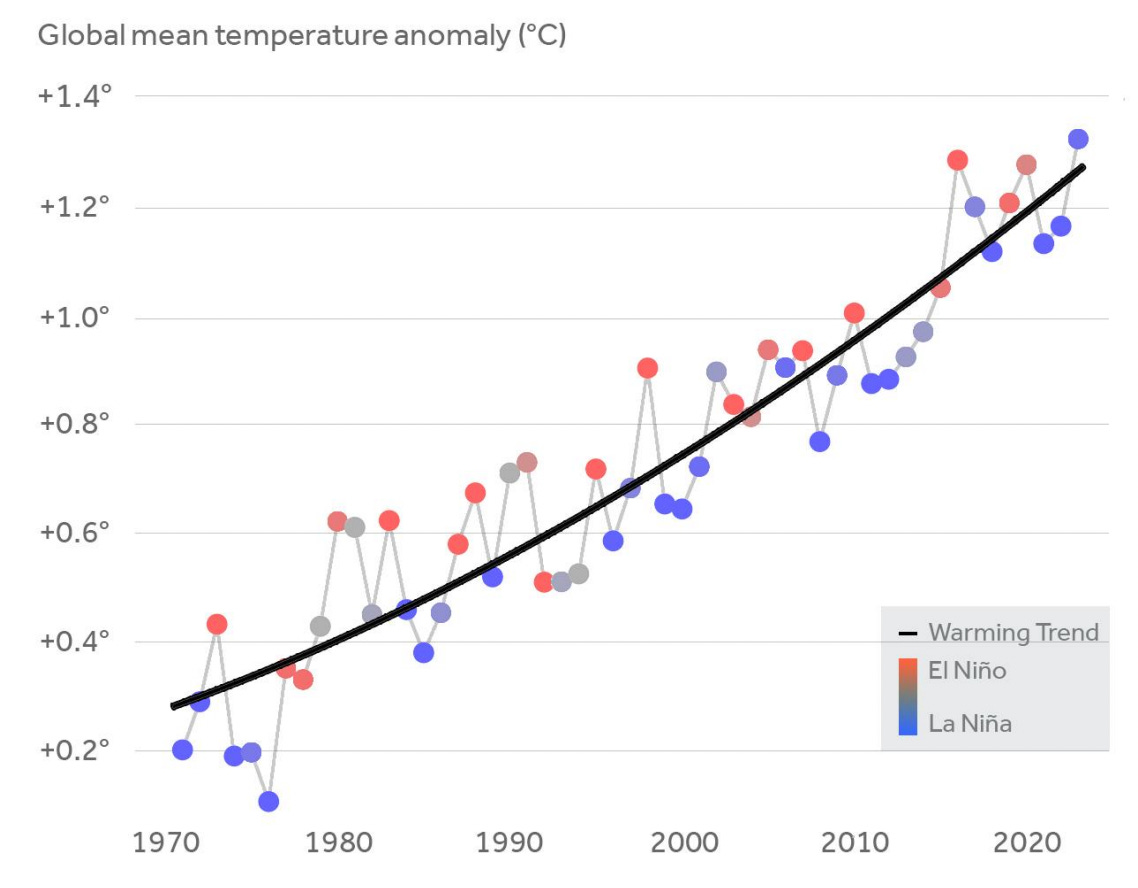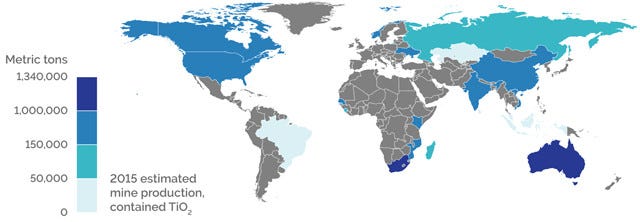Last Week in Collapse: November 5-11, 2023
Bedbugs, overfishing, military action, xenophobia, and nanoplastics. Collapse: are we there yet?
This is Last Week in Collapse, a weekly newsletter bringing together some of the most important, timely, useful, soul-crushing, ironic, astounding, or otherwise must-see/can’t-look-away moments in Collapse.
This is the 98th newsletter. You can find the October 29-November 4 edition here if you missed it last week. Thank you for subscribing to the Substack.
The last 12 months were the hottest on record, according to a 15-page report from Climate Central. Saudi Arabia, Mexico, and Indonesia are particularly hard hit by rising temperatures. The implications are dire.
Over 90% of global fish stocks are “fully exploited” according to the United Nations. China specifically is being blamed for the dramatic increase in overfishing, with a fleet that grew 500% over the last decade to now consist of over 550,000 vessels. By the end of this decade, China is projected to be responsible for 37% of global fishing. However, the growth of Japanese, Taiwanese, Vietnamese, and Spanish ships is also a cause for concern. Overfishing, plus devastating “bottom trawling” practices, are leading to a domino dieoff effect for many aquatic ecosystems. The destruction of seagrass also limits carbon sequestration in the oceans. Other fish are dying from hotter temperatures in the sea.
Low rainfall, and the weaponization of water installations has complicated the relationship between Türkiye, Syria, and Iraq, where years of drought and conflict have damaged society. Crop cultivation and livestock ranching is down. 60% of Syrians lack reliable access to safe drinking water. Türkiye uses upstream dams to reduce river flows, increasing its leverage over border zones that it seeks to control. Scientists blame humans for the warmer, drier conditions in the Greater Middle East.
A new 30-page report from a British-American think tank claims that the British & American governments owe $111B ($5B and $106B, respectively) in “climate reparations” for the 430 metric tonnes generated by their armed forces—since the 2015 Paris Climate Accords. The report, which claims to be “extremely conservative” in valuing the impacts of the two militaries, calculated this figure based on the “social cost of carbon.” Will this development make it more or less likely for states to act on climate issues?
A Panamanian-American lawyer shot & killed two environmental protestors blocking a road in Panama. A U.S. court upheld a controversial Alaska mining project by ConocoPhillips to drill for oil & gas.
While some nations are appearing to move towards renewables, it is estimated that the United States, Russia, and Saudi Arabia will extract record fossil fuels in 2030. A new study suggests that “catastrophic forest ecosystem collapse” is likely in the UK within 50 years.
There are only two permanent ice sheets on planet earth, one in the Antarctic, and the other in Greenland. These two ice sheets account for more than two thirds of all freshwater reserves. 3 of the 8 ice shelves in Greenland have already collapsed; the other 5 are on their way out. Scientists are panicking about how the climate (and sea level) will change when the ice sheet is gone forever. Read the 10-page study here if you’re interested. It is also predicted that melting sea ice will result in more earthquakes.
Lightning is the leading cause of wildfires in boreal forests, which of course results in greater CO2 emissions and ecosystem destruction. As the air warms, lightning will become even more common, perpetuating a feedback loop that we are already in the midst of.
Amazon deforestation hit a 5-year low. There were “only” about 9,000 square km of land deforested from August 2022 to July 2023, equivalent to the size of Corsica or Puerto Rico. Africa’s plastics problem is spiraling out of control. Part of Iceland declared a state of emergency regarding a soon-predicted volcanic eruption.
Global wine production is the lowest it’s been in 60+ years, and climate change is being blamed. Freak weather patterns, droughts, and flooding have reduced grape harvests. Australia has started granting the first ever climate refuge visas to the people of Tuvalu (pop: 11,200); however, they are pledging just 280 visas per year.
A growing number of people are not planning to have children because of our unravelling climate. Others are too broke or busy. Yet some philosophers still argue that there aren’t enough humans on planet earth (pop: 8,050,000,000).
Vicious El Niño-linked flooding in Somalia displaced 300,000+ people and accounted for at least 40 deaths in Somalia and Kenya. Thailand is on track for its hottest and driest year ever. Ireland’s largest lake is being swamped by algae. Last October, in addition to being super hot, was also the moistest on record.
A hitherto underestimated factor in Collapse is metabolism—and how rising temperatures can increase it. A higher metabolism requires more energy to sustain life, propelling more consumption of food. During times of drought or flooding or economic hardship or conflict, when food is already limited, this will increase pressure for one of our most precious resources.
Parts of China & Taiwan have seen record November temperatures. Scattered wildfires still burn in Greece. The UN adjusted its estimates for the number of species it considers to be endangered: the new number is two million species—double previous estimates.
——————————
At least 17 outbreaks of bedbugs have occurred in South Korea since September. In the UK, infestations increased 65% since last year. Although they bite and irritate humans, they do not spread diseases. Bedbugs are notoriously difficult to exterminate, and have been around for over 100M years, according to scientists. At least we know one organism likely to survive Collapse…
Nursing homes in the U.S. are suffering from a lack of workers from a combination of low wages, devastating burnout, and lingering fallout from COVID. A tuberculosis outbreak in a California casino sparked fears that hundreds may have contracted TB there over the past 5 years. TB worldwide is at record highs, with 7.5M infections recorded last year.
Chinese investment overseas, mostly in the so-called Global South, has ballooned now to somewhere between $1.1 Trillion USD and $1.5 T. Some people are worried about how China will collect on its debt once it becomes clear that countries are unable to pay it back. Yet China argues that the U.S. has historically been the biggest debt-trapper nation, with a record of unproductive interference.
American beef hit record prices, a result mostly of drought pushing feed prices up. Half a million Brazilians have lost power after a storm blasted Sao Paolo. Titanium shortages grow, as does the so-called “artificial” rice shortage.
U.S. credit card debt grew 10%+ this year, sitting now at $1.08 T. The annual interest payments on U.S. government debt have also surpassed $1T this year. Total American government debt is now $33.7 trillion USD. If distributed evenly among Americans, it would exceed $100,000 per citizen.
A 46-page assessment of the power grids in the U.S. and Canada concluded that some power networks may face serious strain during peak winter conditions. Lucky for them, winter is almost a thing of the past. The report also has personalized region analysis if you live in North America and want to read about your area’s power grid.
Microplastics are everywhere, in our lakes, and in clouds, and in our blood. It is estimated that the average human eats between 7-287 grams of plastics per year. Microplastics are also being consumed by plankton, which may sound good—however, they’re making everything worse. By digesting microplastics, they break down into smaller particles: nanoplastics, which are even harder to manage. Plastic production is expected to triple over the next 40 years, even as representatives from around the world convened in Nairobi to agree on a framework for managing plastic pollution.
The International Food Policy Research Institute released 4 reports about the convergence of climate change, food, and economics: one for Mozambique, another for Kenya, one for Malawi, and another for Zambia. They’re each about 40 pages, and they draw some overlapping conclusions: droughts, flooding, and severe weather events will become more common. Maize yields will go down, roads will be damaged, livestock will die. Water management is one of the most pressing challenges ahead.
——————————
The ruling junta in Myanmar suffered several surprise defeats against the various insurgents in the country’s northeast. 50,000+ people have been displaced so far, and the President has even admitted the possibility of the state breaking apart. For years, the government forces have been unable to make gains against rebel forces.
Protests in Spain grow amid the purported governmental plans to grant amnesty to Catalonian separatists. At least 3 workers have been killed in Bangladeshi textile strikes, which persisted for their second week. In Tunisia, refugees hide in the expectation that the UN is coming to help them. In Ethiopia, ethnic/political violence continues, killing over 150 people in the week ending on November 3.
Keep reading with a 7-day free trial
Subscribe to Last Week in Collapse to keep reading this post and get 7 days of free access to the full post archives.







